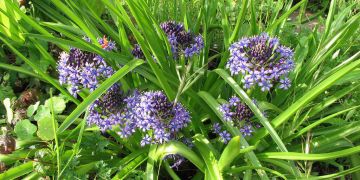This bulb can weigh up to four pounds. It is normally harvested after the base leaves have withered, a time when the medicinal properties of the bulb are at their highest levels.
There are two varieties of Scilla distinguished by herbalists, 25 varieties distinguished by horticulturists, each with slightly different chemical properties. Red squill(Drimia maritima), often referred to as Indian Squill, contains a toxin called Scilliroside. This toxin is harmful to all creatures and deadly to those unable to rid itself of the toxin through vomiting. This is why red squill is commercially prepared for use as a rodent poison. White Squill (Scilla mischtschenkoana, also known as European squill, is the most common used for herbal supplements. White squill is not known to contain the toxin scilliroside, although some have been found to have trace amounts. This is believed it be the result of cross pollination.
The compounds that make squill desirable for medicinal purposes are found in the inner layers of the bulb. Just as an onion is peeled, squill’s outer layer is removed and discarded. The inner layers are finely sliced, dehydrated and ground into a powdered form to use in medicines. Squill can be distilled as vinegar. It is often prepared in liquid form as an extract or juice. The bulb can also be mashed to use in poultices.
Ancient physicians surrounding the Mediterranean Sea used squill as a remedy for coughs, as an expectorant and as a diuretic. It is also believed they used a tonic containing squill to assist the function of a patient’s heart. These ancient physicians were aware of the poisonous effect on animals, including humans, from the over consumption of any remedy containing squill. Writings describing squill, its’ usage and effects , can be found in Egyptian writing dating from 1500 BC and in various writings from the ancient Greeks.
Squill is found in remedies used to treat various lung diseases. Tonics are prepared for persons suffering with asthma, chronic bronchitis and those with whooping cough. The addition of squill to the body stimulates the production of phlegm, thinning the thickened mucus found in the patient’s airways and allowing it to be expelled more easily.
Medications containing squill are still used in some countries by traditional physicians to treat irregular heartbeats, mild heart failure and other heart-related issues. The bulb contains glucosamides, aiding the stimulation of the heart. Squill extract’s affect on the heart is both slowing the beats per minute and increasing the force of each individual beat. It has been found to take affect faster than that of Digitalis extract, which is more commonly used and is more readily absorbed.
As well as the major medical issues such as chronic kidney disease and cardiovascular problems, squill is used to treat a wide variety of mild complaints. Chronic pain, stemming from over-stressed muscles and diseases such as Fibromyalgia, can be alleviated by squill extracts. The extract is thought to have some analgesic properties, though more research is needed to confirm this fact. Squill supplements can be effective in regulating a woman’s menstrual cycle. It is sometimes prepared as a hair tonic to relieve dandruff and seborrhea. It can be used externally as a poultice, on bruises, burns, cuts, and other open sores. When the bulb is roasted before it is added to a poultice, it can be useful to treat corns. Warts can also be removed with the help of squill.
Squill is widely available in many different forms. Squill extract is used to create tonics. Many cough remedies contain squill. Some squill cough remedies were first made by Pythogoras in ancient Greece, and are still available today. Squill supplements are available in both capsules and in tablet forms. Most supplements have had opium added to them as a way to calm the inflammation of the gastro-tract due to the affect of the squill.





